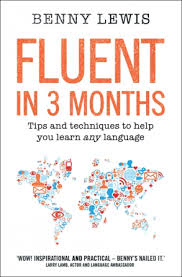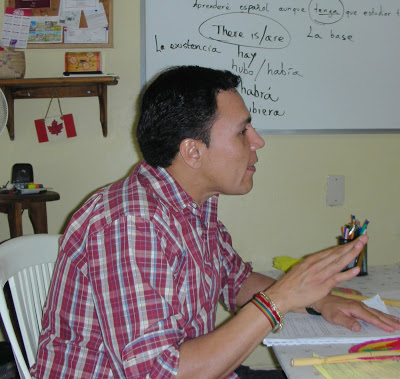I have been working hard lately on my Spanish and am determined to improve and improve a lot. I’ve been listening to podcasts and lessons on my walks in the morning and have been pushing myself to use what I learn by talking to people much more. But sometimes luck can intervene, and for me it did in the book at the top of the post. (click the image to check it out on Amazon) The author, Benny Lewis, has so many interesting and different suggestions for how to approach language learning which make perfect sense to me.
I can’t summarize the entire book here but he addresses some of my struggles with such basic and smart advice! To start with he uses the CEFRL scale to evaluate fluency and to set goals. I’ve made the mistake of wanting to “be fluent” but I didn’t say when and I didn’t define fluent for myself. Now I can set short goals to get myself moving forward.
He talks about people in an “expat bubble” (ahem) and how to continue looking for ways to improve even though you can function well in your new language. He says if you’re still conducting your most complex discussions in your native language you need to remind yourself that your work isn’t done! He gives plenty of ideas for how to get to the next level, too. He uses Skype conversations with native speakers a lot, and turns off the video when he finds he’s using visual clues too much, too! Thinking of strategies for improvement and giving yourself a plan are so important!
I loved his comments on learning grammar. He says “The problem with learning grammar at the start of our language projects, or when we are not used to truly communicating in the language at some level , is that we have nothing to attach these boring rules to.” But he says that after we have been speaking (and struggling) with the language for a while we will enjoy the help that grammar rules give us.
I took French classes for many years and found French to get in the way of learning Spanish at times. He suggests if this happens for you to learn the new language using books written in the first language. It really helped him when he was learning Dutch and German kept getting in the way. A book about the Dutch language written in German was just the ticket.
He stresses having fun and that your goal is to communicate and make friends. He suggests you keep checking on your skills with native speakers and incorporate their comments into your learning plan. I will read this book again, I’m sure… but it is already making a difference for me with my approach to my Spanish learning. Below is a TedX lecture he gave that gives you the overview in his own words.
In addition to the book above, I ran into another book that is having a huge effect on me. This book isn’t focused on learning languages but learning anything. There are lots of examples of what kind of studying actually leads to retention of the material, and some of the results surprised me. For example, if one group practices beanbag throwing at a bucket three yards away and another group practices throwing at buckets two and four yards away, in contests with a bucket three yards away the two and four yard group will outperform the three yard group. By a lot, too. So practice all around your target to show the most improvement. Don’t cram, don’t just re-read material, and test yourself often. There is so much here, and it really goes along with Benny’s book, above. This is going to help me a lot.
Among the many interesting and helpful ideas in this book is to take time for reflections. After a conversation or reading something or a study session take the time to reflect on it. What did you learn? What went right or wrong? What frustrated you? These are chances for improvement. Use the information to propel yourself to the next level.
This book discusses how important it is to test your knowledge a lot. They did scientific studies of students who had a mid-term and a final and possibly a pop quiz compared to students who had many quizzes throughout the course. The ones with the the quizzes remembered information from earlier in the course and could use their learning in a much more analytical way. So now I know I need to quiz myself more, and they say even flash cards (as long as you shuffle them) are a really good way to reinforce learning.
I plan on reporting in my next installment on the topic what shape my language learning plan took and how rapidly I have improved. Stay tuned!
– Blog reader RJ recommended in the comments a free flash card application called ANKI which I have already downloaded and think I’m going to love, as well as the book below. Thanks, RJ!







Mexico Cooks
July 21, 2014Nancy, this is an exceptionally good article–thanks for writing it and thanks for posting it on FB. You offer so many excellent tips for learning a language!
It sounds like these two books are helping you a whole lot. The next best thing you can do is just open your mouth and talk–in Spanish. Make mistakes, but just talk! Mexicans are enormously forgiving when foreigners are learning and are always really eager to help out. It took me a while to learn my most important lesson: no one would laugh at my efforts. Now I can laugh at my own mistakes, and even after 30+ years, still learn new words that expand my vocabulary.
Thanks again for a fantastic article. Keep up the good work!
Cristina
Nancy
July 21, 2014Thanks so much, Cristina. These books are very inspiring as I think I am a “non-traditional” learner. Sitting down with books to study grammar just makes me want to take a nap. But I think “Make it Stick” will be a good one to give my grandkids, as one is heading to college this year and another is starting high school. I do talk to people a lot – quite a lot – but because I have not pushed myself with the right kind of self directed goals and plan I just stay at about the same level. I’ll never improve unless I really make a plan and work at it. And if Barry’s style is any indication, it will be fun, too. Thanks for the encouragement.
Wendy Kain
July 21, 2014A good read Nancy. Benny Lewis is such and interesting young guy, and I love the idea of learning about “the science of learning”. Thanks for letting us have this.
Bliss
July 21, 2014I’ve been thinking about the process of learning, and what sticks in my aging brain (and what slides right out). Great to know we can still learn some new tricks.
Mexico Cooks
July 21, 2014I saw a cartoon this morning–the picture was a past-middle-aged woman sitting on a day bed, looking at the view from a her window. The caption said, “I actually think I have some extra spare time today…or else I just forgot what it is I’m supposed to be doing.”
Amen, sisters.
RJ
July 22, 2014I came across this website recently. It’s maintained by someone who must learn several languages because he is a professional opera singer. He uses Anki, free spaced repetition software for learning languages and many other things.
http://fluent-forever.com/
http://ankisrs.net/
Nancy
July 22, 2014Wendy, You’re welcome!
Bliss, I believe we can still learn, I know you do, too!
Cristina, That cartoon is my life!
RJ, Thanks so much for these links, I have downloaded ANKI and am loving it already. I’ve also added a link to Fluent Forever to the bottom of my post.
Shannon Casey
July 22, 2014Breaking out of Beginner Spanish by Joseph J. Keenan is also a great book. Good luck and good for you for sticking to it!
Contessa
August 2, 2014Great post Nancy. You are so good about sharing wonderful things and giving us the tools to make changes.